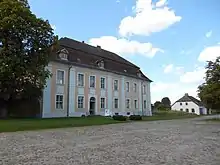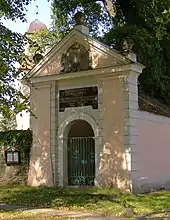Michael Gabriel Fredersdorf
Michael Gabriel Fredersdorf (1708 in Gartz – January 12, 1758 in Potsdam, then Prussia, now Brandenburg, Germany) is famous as the longest-standing valet and companion of Frederick II of Prussia.
Michael Gabriel Fredersdorf | |
|---|---|
.jpg.webp) | |
| Born | 1708 Gartz, Kingdom of Prussia |
| Died | January 12, 1758 |
| Nationality | German |
| Occupation | Valet |
| Known for | Friendship with Frederick the Great |


The two young men met when the future Frederick II was still in prison for having attempted to run off with his former companion, Hans Hermann von Katte. At the time, Fredersdorf was four years older than the heir to the throne and served in the army, being the son of a peasant.
Both contemporaries and historians[1][2][3][4] have speculated that Fredersdorf and Frederick II had a homosexual relationship, yet there is no definitive proof. Voltaire would later describe the relationship in his Memoires as, "This soldier, young, handsome, well made, and who played the flute, served to entertain the prisoner in more than one fashion."[5]
When Frederick moved to Rheinsberg Palace with his wife in 1736, he made Fredersdorf his valet. When he ascended to the throne in 1740, he furthermore made him his private treasurer and, within less than a month, gave him the estate of Zernikow as a present. Later he also made him director of the royal theatre. When the king moved to Sanssouci, his valet's bedroom adjoined his own, still shown today. The royal gardens director Heinrich Ludwig Manger later called the chamberlain the king's chamber lover in a book of 1789.[6]
Fredersdorf eventually sought to marry, a move which disenchanted the king. Frederick wrote him, "Have your marriage ceremony today rather than tomorrow if that will contribute to your care and comfort; and if you want to keep a little page and a little scout with you as well, do so."[5] In 1753 he married Marie Elisabeth Daum (1730-1810), daughter of Gottfried Adolph Daum, a wealthy private banker and owner of a gun factory who had provided Frederick with credit secretly when he was still crown prince and who received substantial orders of weapons' production during Frederick's wars.
Fredersdorf was dismissed on 9 April 1757, being accused of financial irregularities. He died, ashamed of his lost honor, within less than a year. He was buried in Zernikow. He had no children. His wife however remarried and had children with her second husband, royal chamberlain Johann Labes. Later she raised her grandson, the poet Ludwig Achim von Arnim.
References
- Tim Blanning, Frederick the Great: King of Prussia, Random House 2016, pp. 55-56, p77
- Wolfgang Burgdorf, Friedrich der Große (Freiburg: Herder 2011), pp. 67ff.
- Peter-Michael Hahn, Friedrich II. von Preußen: Feldherr, Autokrat und Selbstdarsteller (Stuttgart: Kohlhammer Verlag 2013), chapter 2.
- Susan W. Henderson, "Frederick the Great of Prussia: A Homophile Perspective", Gai Saber 1, no. 1 (1977), pp. 46-54.
- Compton, Lewis. Homosexuality and Civilisation, Harvard University Press, 2003, p203
- History of Potsdam Buildings, especially under King Frederick the Second, published in 1789/90. vol. 1 (describing the royal architect Friedrich Wilhelm Diterichs' dismissal who "may not have flattered enough to be the king's chamber lover - German: "Kammerliebling" - of that time").
Sources
- Crompton, Louis (2006). Homosexuality and Civilization. Belknap Press. ISBN 978-0-6740-2233-1. (at Harvard University Press)